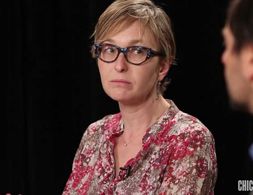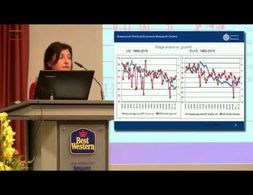648 results
This study aims to provide insights on how the Social and Solidarity Economy (SSE) is contributing to the future of work.
In this course we will critically analyze both economic theory and economic life through the lens of gender. Topics covered include: a critical examination of gender patterns and trends in the household, labor market, and the firm; issues concerning gender inequalities in the economy.
In this 5 weeks online course, the Global Change Institute from the University of Queensland explains different types of climate change policies, the economic theory at their basis and the possible output. Starting from the fundamentals of carbon and climate change policies, and how they have been applied worldwide, the course aims to teach fundamental skills to move towards a low carbon economy.
The Commentary explains the circular value chain and innovation potential along it. Focusing on Israel, examples on how cross-industry collaboration can help supporting a successful positioning in a (Digital) Circular Economy are presented.
Teaching the public about lobbying and its effects on financial institutions that help run the economy in which we all live and use.
In this short video Peter Reich illustrates seven aspects of the state of the US economy. He provides suggestions on how to to get started to move towards a more fair distribution of wealth.
This article considers the strengths of agent-based modelling and the ways that it can be used to help central banks understand the economy. These models provide a complement to more traditional economic modelling which has been criticised in the wake of the Great Recession.
The principle of effective demand, and the claim of its validity for a monetary production economy in the short and in the long run, is the core of heterodox macroeconomics, as currently found in all the different strands of post-Keynesian economics (Fundamentalists, Kaleckians, Sraffians, Kaldorians, Institutionalists) and also in some strands of neo-Marxian economics, particularly in the monopoly capitalism and underconsumptionist school In this contribution, we will therefore outline the foundations of the principle of effective demand and its relationship with the respective notion of a capitalist or a monetary production economy in the works of Marx, Kalecki and Keynes. Then we will deal with heterodox short-run macroeconomics and it will provide a simple short-run model which is built on the principle of effective demand, as well as on distribution conflict between different social groups (or classes): rentiers, managers and workers. Finally, we will move to the long run and we will review the integration of the principle of effective demand into heterodox/post-Keynesian approaches towards distribution and growth.
This article outlines the fundamental challenges of democratically planned economies and categorises proposed models into six groups, each of which approaches planning and coordination at different levels of authority and between myriad economic units in a particular way, taking into account efficiency as well as democratic principles and environmental and social sustainability. Through a classification system based on decision-making authority and mediation mechanisms, the article provides a framework for understanding and comparing these models. By examining their different approaches, it offers insights into the complexities and potential paths of democratically planned economies in the 21st century.
Özlem Onaran analyses the current problems of secular stagnation from a global perspective. At the core of global economic problems is insufficient demand caused by falling wage shares, because most individual countries, and the world as a whole are “wage-led”. Hence a strategy for global growth is to aim at increasing wages and thus the wage share, and the abandonment of policies focusing purely on national competitiveness. Financialization has broken the link between corporate profitability and investment. Reregulation of finance and higher public investment is required in order to crowd in private investment, in this way, reversing the declining trend of potential output growth.
It is fiercely debated when exactly the growth set off and what the drivers of Indian growth were. Scott Alexander summarises some of the recent literature on this question, demonstrating that not only the liberalisation policies of the 90s might be the driver of the take-off, but potentially public investments, political developments or cultural shifts.
Complexity economics focuses on interactions and interdependencies between individuals and structures in economic systems. Those are systems of organised complexity. High importance is given to the analysis of networks.
Pluralism includes mainstream economics. Our campaign for pluralism, including this series, have generally focused on ideas outside the mainstream on the basis that it gets plenty of attention already so we want to spend our time exposing people to alternatives. Nevertheless, mainstream ideas deserve some attention. On top of this, a curious feature of modern economics education is that some of the best ideas from mainstream economics are not even taught to undergraduates! During this series I will explore such ideas, starting today with the market construction technique known as ‘matching’.
The objective of the course is to explore the main strengths and weaknesses of orthodox and heterodox paradigms within development economics.
Austrian economics focuses on the economic coordination of individuals in a market economy. Austrian economics emphasises individualism, subjectivism, laissez-faire politics, uncertainty and the role of the entrepreneur, amongst others.
‘We cannot afford their peace & We cannot bear their wars’:
Value, Exploitation, Profitability Crises & ‘Rectification’
This course is an introduction to Development Economics and is concerned with how economists have sought to explain how the process of economic growth occurs, and how – or whether – that delivers improved well-being of people.
Feminist economics focuses on the interdependencies of gender relations and the economy. Care work and the partly non-market mediated reproduction sphere are particularly emphasised by feminist economics.
Colonial Global Economy is a module of the Connected Sociologies Curriculum Project and examines the ongoing significance of colonial relations in the structure of the global economy It consists of 7 introductory lectures which range between 17 and 39 minutes of length In addition further readings resources and questions for …
Exploring Economics, an open-access e-learning platform, giving you the opportunity to discover & study a variety of economic theories, topics, and methods.
The goal of the class is to acquire familiarity with recently-published research in alternative macroeconomics with a focus on the distribution of income and wealth, cyclical growth models, and technical change.
The article pursues the two related questions of how economists pretend to know and why they want to know at all. It is argued that both the economic form of knowledge and the motivation of knowing have undergone a fundamental change during the course of the 20th century. The knowledge of important contemporary economic textbooks has little in common with an objective, decidedly scientifically motivated knowledge. Rather, their contents and forms follow a productive end, aiming at the subjectivity of their readers.
This course will fundamentally ask whether we can, or even should use the word ‘decolonising’ in our pursuit of a better economics?
What determines the status of women in different communities? What role is played by women’s labor (inside and outside of the home)? By cultural norms regarding sexuality and reproduction? By racial/ethnic identity? By religious traditions? After some brief theoretical grounding, this course will address these questions by examining the economic, political, social, and cultural histories of women in the various racial/ethnic groups that make up the US today.
Neoliberalism is dead. Again. After the election of Trump and the victory of Brexit in 2016, many diagnosed the demise of the ideology of Margaret Thatcher, Ronald Reagan, Augusto Pinochet, and the WTO. Yet the philosophy of the free market and the strong state has an uncanny capacity to survive and even thrive in crisis.
Why is it that some countries become rich while others remain poor? Do markets require regulation to function efficiently? If markets offer an efficient way of exchanging goods, why do individuals even create firms?
Throughout 2022 it has become increasingly difficult for people around the world to meet their basic needs – even those who live in relative affluence in the Global North. This 30-minute classroom exercise takes this common recent experience as a starting point for an exploration of the different economic mechanisms and organisations that can be used to provide for people’s basic needs.
Why are income inequalities so large and why do they continue to increase in so many countries? What role can minimum wages play in reducing social and economic inequalities? What is a good system of wage bargaining? What constitutes a fair wage?
Ride hailing home sharing meal delivery and other forms of digitally powered task sharing are creating jobs and growth in Europe and significant policy challenges What should be the responsibilities of these new platforms how should workers be classified and how can insurers and others provide services to this new …
Economics has become a monolithic science, variously described as formalistic and autistic with neoclassical orthodoxy reigning supreme. So argue Dimitris Milonakis and Ben Fine in this new major work of critical recollection.
Homo sapiens is now evolving into post economy The New Economy must manage scarcity and affluence a dual problem that is not integrated into the main classical economic theories There will be an important shock between opulence described by the economist John Kenneth Galbraith in The Affluent Society and scarcity …
Mr Minsky long argued markets were crisis prone His moment has arrived The Wall Street Journal In his seminal work Minsky presents his groundbreaking financial theory of investment one that is startlingly relevant today He explains why the American economy has experienced periods of debilitating inflation rising unemployment and marked …
Nous utilisons des cookies sur notre site Web. Cliquez sur Accepter pour nous aider à améliorer constamment Exploring Economics !
























